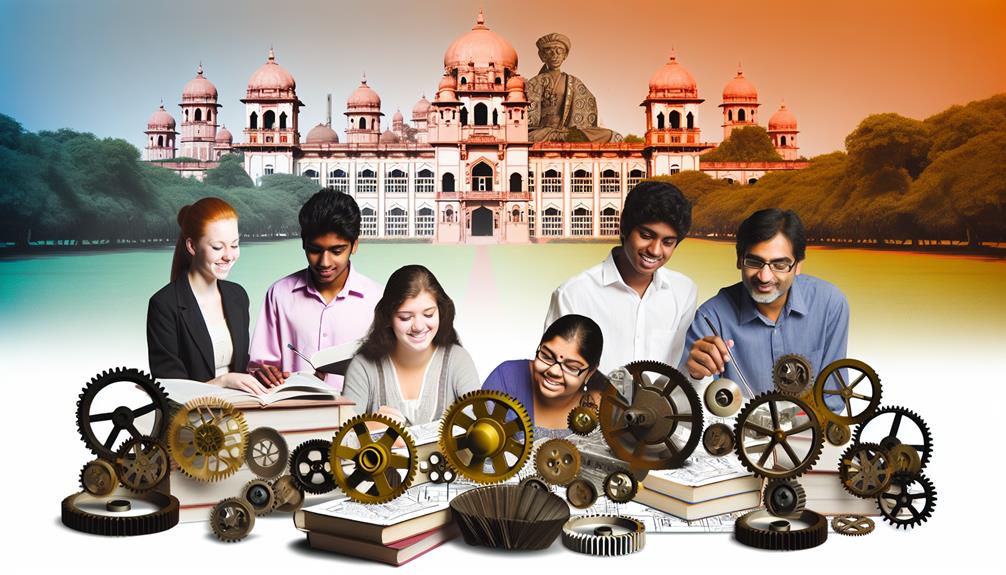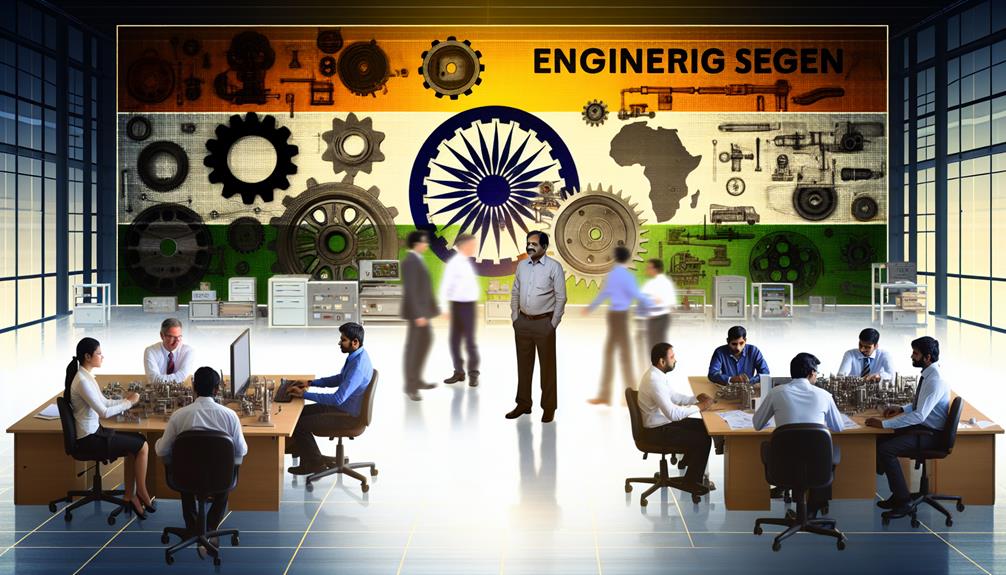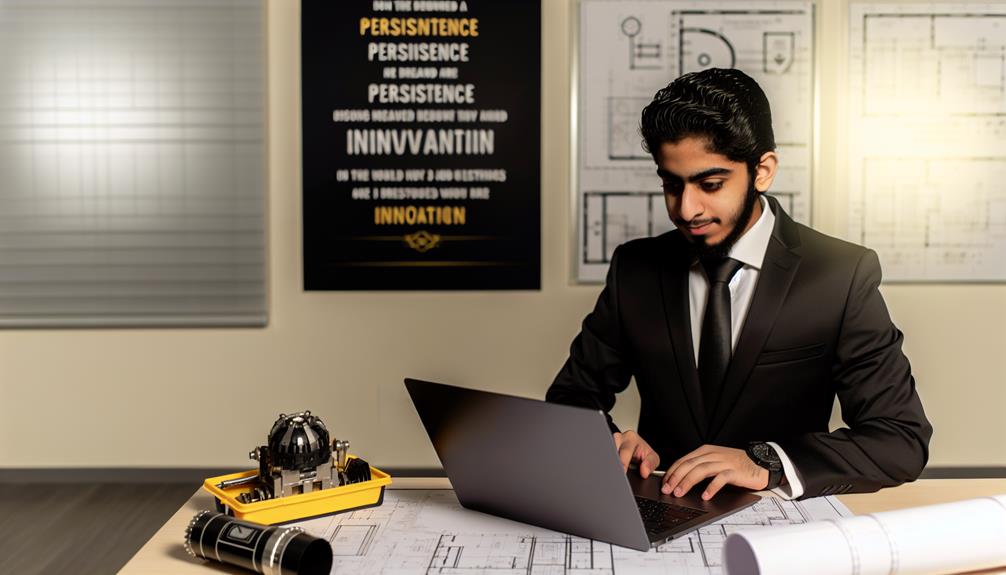How to Get a Job in Mechanical Engineering in India
Isn't it fascinating how the right combination of education and experience can open doors in mechanical engineering? To secure a position in this competitive field in India, you'll need to navigate several essential steps that go beyond just earning a degree. From mastering key software tools to networking effectively, the path can seem intimidating. Yet, understanding each component—like the importance of certifications or the best job search strategies—can greatly enhance your prospects. So, what specific skills should you focus on to stand out in a crowded job market?
Key Takeaways
- Obtain a Bachelor's degree in Mechanical Engineering or a three-year diploma, ensuring a minimum of 50% in 12th standard with a science background.
- Prepare for common entrance exams like IIT-JEE and AIEEE to secure admission into reputable engineering programs.
- Gain practical experience through internships and hands-on projects during your studies to enhance employability.
- Acquire essential skills in CAD software and core engineering principles, along with certifications for specialized expertise.
- Utilize job portals, network at industry events, and tailor your resume to effectively search for mechanical engineering positions.
Requirements for Mechanical Engineers
To kickstart your career in mechanical engineering, you'll need a solid educational foundation. A Bachelor's degree in Mechanical Engineering is mandatory, although you can also pursue a three-year diploma for entry-level positions. To enroll in a B.Tech program, you'll need to clear common entrance exams like IIT-JEE, AIEEE, or BITSAT, guaranteeing you've secured at least 50% in your 12th standard with a science background.
Gaining practical experience through internships is crucial. These hands-on opportunities help you tackle career challenges and enhance your employability. Alongside your degree, consider obtaining industry certifications, such as the Professional Engineer (PE) license, which can set you apart in a competitive job market.
For success in this field, proficiency in CAD software is critical, along with strong analytical, problem-solving, and communication skills. Remember, continuous learning is essential; staying updated with industry standards and advancements guarantees you maintain a competitive edge. By focusing on these requirements, you'll position yourself for success in the dynamic and rewarding world of mechanical engineering.
Educational Pathway Overview

To kickstart your journey in mechanical engineering, you'll need a solid foundation in physics, chemistry, and math during your 12th standard, achieving at least 50% aggregate. Entrance exams like IIT-JEE, AIEEE, and BITSAT are essential for securing a spot in a reputable B.Tech program. Completing a four-year degree will set you on the right path, but don't overlook the value of continuous learning to stay competitive in the field.
Key Educational Requirements
Beginning a career in mechanical engineering requires a clear educational pathway that starts with solid academic foundations. To set yourself up for success, consider these key requirements:
- Strong Academic Performance: You need a minimum of 50% aggregate in your 12th standard, focusing on physics, chemistry, and mathematics.
- Bachelor's Degree: Enroll in a four-year B.Tech program in mechanical engineering. Alternatively, you can pursue a three-year diploma in mechanical engineering, which can also open doors to entry-level positions.
- Advanced Education: For those aspiring to senior roles, obtaining an M.Tech or MBA can greatly boost your career prospects and earning potential.
As you navigate your educational journey, don't forget to explore scholarship opportunities offered by various educational institutions. These can ease your financial burden and help you focus on your studies. Additionally, engage in continuous learning through workshops and online courses to keep your skills sharp and aligned with industry demands. By following this educational pathway, you'll be well on your way to a successful career in mechanical engineering.
Entrance Examination Details
Securing a spot in a reputable mechanical engineering program hinges on your performance in entrance examinations. To get started, you'll typically need to take exams like IIT-JEE, AIEEE, or BITSAT after completing your 12th standard with a science background, including physics, chemistry, and mathematics. Make sure you achieve a minimum aggregate score of 50% in your 12th standard to qualify for these exams.
Understanding AIEEE exam patterns is essential, as it'll help you focus your study efforts effectively. Additionally, implementing strong IIT JEE preparation strategies can greatly enhance your chances of success. This involves practicing previous years' question papers, taking mock tests, and joining coaching classes if necessary.
Once you clear these entrance exams, you can enroll in a four-year B.Tech program in mechanical engineering or opt for a three-year diploma. Top institutions like IIT Kharagpur, BITS Pilani, and IIT Madras not only offer excellent education but also boast impressive placement records, with average CTCs for graduates ranging from INR 15 LPA to INR 28.9 LPA. So, gear up and give your best shot at these entrance exams!
Gaining Practical Experience

Gaining practical experience is essential for aspiring mechanical engineers in India, as it greatly boosts your employability. To enhance your job prospects, consider the following avenues:
- Internship Opportunities: Pursue internships during your B.Tech or diploma program. These positions provide hands-on experience, making you more attractive to employers who often prefer candidates with practical exposure.
- Cooperative Education Programs: Engage in cooperative education programs that allow you to gain valuable experience while earning academic credit. This dual benefit not only enriches your resume but also helps you develop relevant skills in real-world settings.
- Industry Projects and Collaborations: Participate in industry projects or collaborations to apply your theoretical knowledge to practical problems. This experience can considerably increase your skill set and job readiness.
Additionally, consider shadowing professionals in the field to gain insights into their daily responsibilities and areas of specialization. Joining engineering clubs or participating in competitions, such as hackathons, can also foster teamwork and problem-solving skills essential for mechanical engineering roles. By actively seeking these experiences, you'll set yourself apart in the competitive job market.
Essential Skills for Success

To succeed in mechanical engineering, you need a solid mix of technical proficiency and soft skills. Mastering CAD software is essential for design roles, while strong analytical abilities will help you solve complex problems. Don't forget the importance of effective communication; collaborating with teams is a big part of bringing engineering projects to life.
Technical Proficiency Requirements
Often, aspiring mechanical engineers find that mastering essential technical skills is essential for their success in the field. To stand out in this competitive landscape, focus on these key areas:
- Design Software Proficiency: Get comfortable with CAD tools like AutoCAD and SolidWorks. These design software programs allow you to create detailed models and simulations of mechanical components, which is critical for any engineering role.
- Understanding Manufacturing Processes: Familiarize yourself with material selection and manufacturing processes. Knowing material properties and production techniques can greatly impact the efficiency and effectiveness of your designs.
- Core Engineering Principles: Brush up on thermodynamics fundamentals and fluid mechanics. These concepts are particularly important in sectors like energy systems, HVAC, and aerospace engineering, where they form the backbone of many projects.
Additionally, don't underestimate the importance of effective communication strategies and teamwork dynamics. Collaborating with professionals from various disciplines is often essential for bringing complex projects to life. By honing these technical skills, you'll be well-prepared to tackle the challenges of a mechanical engineering career in India.
Soft Skills Importance
In today's competitive landscape, mastering soft skills is just as important as technical expertise for mechanical engineers. You'll find that skills like effective communication and team collaboration greatly enhance project efficiency in multidisciplinary environments. As an engineer, being able to express your ideas clearly and listen actively to others will foster better teamwork and lead to innovative solutions.
Problem solving is another essential skill. When faced with challenges, your ability to think creatively and adapt your approaches can make a huge difference in project outcomes. Adaptability skills allow you to understand client needs and adjust designs accordingly, ensuring your solutions are practical and relevant.
Time management is also crucial. By prioritizing tasks effectively, you can meet project deadlines in fast-paced industries. Finally, strong interpersonal skills are important for networking strategies. Cultivating relationships in the engineering field can lead to job opportunities and career growth.
Incorporate these soft skills into your professional toolkit, and you'll not only enhance your employability but also pave the way for a successful career in mechanical engineering.
Importance of Certifications

Certifications play an essential role in boosting your employability as a mechanical engineer in India. By obtaining relevant certifications, you not only enhance your skills but also showcase your commitment to professional development. Here are three key certification benefits that can elevate your career:
- Specialized Knowledge: Certifications like Six Sigma or PMP signal your expertise in areas such as quality control and project management, which are critical in sectors like manufacturing and automotive.
- Industry Recognition: Many employers actively seek candidates with specialized certifications, as they often correlate with higher salaries and better job security. Holding a Professional Engineer (PE) license, for example, demonstrates your dedication and ability to meet rigorous industry standards.
- Continuous Learning: Pursuing certification programs keeps you updated on the latest industry trends and technological advancements, essential for maintaining your competitiveness in the job market.
In today's competitive landscape, investing your time in relevant certifications can greatly enhance your prospects as a mechanical engineer. Take the initiative, explore your options, and let your certifications pave the way for your success!
Exploring Career Opportunities

In the mechanical engineering field, you'll discover a range of exciting job roles, from Design Engineer to Quality Control Engineer, each with its own unique challenges. The industry demand for skilled engineers is on the rise, especially in sectors like aerospace and renewable energy, making now a great time to explore your options. By honing your skills and understanding market trends, you can position yourself for a successful career in this dynamic field.
Key Job Roles
Mechanical engineering offers a variety of exciting career opportunities that cater to different interests and skill sets. As you explore your options, you'll find key roles that align with your aspirations in design innovation and manufacturing processes. Here are three prominent job roles in the field:
- Design Engineer: Focus on creating innovative products and solutions, utilizing CAD software to bring concepts to life.
- Manufacturing Engineer: Oversee production processes, ensuring efficiency and quality in manufacturing operations.
- Automotive Engineer: Work on designing and improving vehicles, contributing to advancements in automotive technology.
Each role varies in responsibilities and salary expectations. For instance, automotive engineers typically earn around INR 7 LPA, while aerospace engineers can command salaries up to INR 16 LPA for senior positions. Additionally, specializing in emerging fields like robotics or renewable energy can enhance your earning potential and open doors to advanced technology sectors.
Industry Demand Trends
As you navigate the job market, it's clear that the demand for mechanical engineers in India is on the rise, fueled by growth in various sectors like automotive, aerospace, and renewable energy. With over 5,000 job openings currently available, employment growth is promising for aspiring engineers. Government initiatives like Make in India are greatly boosting opportunities, especially in manufacturing and construction.
Here's a quick overview of the current trends:
| Sector | Job Opportunities | Average Salary (INR LPA) |
|---|---|---|
| Automotive | 1,500 | 4.5 – 7 |
| Aerospace | 800 | 5 – 8 |
| Manufacturing | 2,000 | 4.5 – 7 |
| Renewable Energy | 700 | 6 – 10 |
| Robotics & Automation | 1,000 | 7 – 12 |
Entry-level salaries range from INR 4.5 LPA to INR 7 LPA, with senior roles exceeding INR 15 LPA. As automation, robotics, and AI integration continue to evolve, gaining expertise in these areas can greatly enhance your career prospects. Major employers like Tata Motors, ISRO, and Bosch are actively looking for skilled professionals, so seize the opportunities ahead!
Salary Expectations by Role

When considering a career in mechanical engineering in India, understanding salary expectations is vital for making informed decisions. Your earning potential can vary considerably based on your role and experience. Here are three key salary ranges to keep in mind:
- Entry-level Mechanical Engineers: Expect around INR 1.4 LPA, while experienced professionals can earn up to INR 7.5 LPA.
- Design Engineers: Entry-level salaries range from INR 4.5 to 6 LPA, with senior positions earning between INR 8 to 12+ LPA.
- Aerospace Engineers: This specialization offers lucrative opportunities, with senior roles earning up to INR 16+ LPA.
When you're maneuvering salary negotiations, it's imperative to research industry comparisons to guarantee you're getting a fair offer. Specializations, like Thermal Engineering, can also impact your salary considerably, with entry-level roles earning INR 4 to 5.5 LPA and senior roles reaching up to INR 12 LPA. By understanding these salary expectations, you can position yourself better during negotiations and make informed choices about your career path in mechanical engineering.
Top Employers in the Industry

Frequently, aspiring mechanical engineers wonder where they can find the best job opportunities in India. To start, consider major players like Tata Motors, Mahindra & Mahindra, and Larsen & Toubro. These top employers are known for their strong recruitment drives and diverse job openings, catering to various skill levels.
Public Sector Undertakings (PSUs) such as BHEL and ISRO also offer stable prospects with competitive salaries and benefits, making them attractive options. If you're looking for a dynamic environment, multinational corporations like Siemens and Bosch are expanding their operations in India. They actively seek skilled mechanical engineers for a wide range of roles.
Don't overlook the automotive sector, either. Companies like Maruti Suzuki consistently offer positions for both fresh graduates and seasoned professionals. Additionally, keep an eye on startups and small-to-medium enterprises (SMEs) that are increasingly hiring engineers, particularly in innovative fields like renewable energy and automation.
Job Search Strategies

Maneuvering the job market in mechanical engineering requires strategic planning and proactive efforts. Here are three effective job search strategies you should consider:
- Utilize Job Portals: Websites like Naukri.com host over 71,685 mechanical engineering positions. Regularly search and apply for roles that match your skills and interests.
- Network: Attend networking events, both online and offline, to connect with industry professionals. These connections can provide valuable insights into job openings and company cultures that you won't find on job portals.
- Tailor Your Application: Customize your resume and cover letter to align with each job description. Highlight relevant skills and experiences to make yourself stand out to recruiters.
Additionally, invest time in interview preparation and consider taking online courses to enhance your skills. Joining professional associations can also offer resources and networking opportunities that bolster your job search. Remember, participating in internships and hands-on projects during your studies can greatly improve your attractiveness as a candidate. Stay updated on industry trends, like automation and renewable energy, to guarantee your skills meet market demands.
Future Trends in Mechanical Engineering

As you navigate your job search, staying informed about future trends in mechanical engineering can greatly boost your career prospects. One key area is AI integration, which is set to enhance efficiency and innovation in design and manufacturing processes. Embracing these advancements will position you as a valuable asset in the industry.
Renewable energy technologies, especially in wind and solar, are also driving demand for skilled mechanical engineers. By focusing on sustainable solutions, you can align your career with global energy needs. Additionally, the rise of electric vehicles (EVs) is creating specialized roles in battery technology and vehicle design, so consider gaining expertise in these areas.
Robotics applications and smart technologies are expanding rapidly, requiring engineers who can develop advanced automation systems. Staying ahead in this field means committing to continuous learning and adaptability, particularly with emerging technologies like 3D printing and nanotechnology.
Frequently Asked Questions
How to Get a Good Job in Mechanical Engineering in India?
To get a good job in mechanical engineering, focus on crafting a strong resume that highlights your skills and experiences relevant to the role. Use resume tips like quantifying achievements and tailoring content for each application. For interview preparation, research common questions and practice your responses to showcase your technical knowledge and problem-solving abilities. Don't underestimate the power of networking; connect with industry professionals to uncover hidden job opportunities and gain valuable insights.
Are Mechanical Engineers in Demand in India?
Imagine a bustling factory where each machine hums in harmony, powered by the latest mechanical engineering trends. You've got to know that mechanical engineers are in high demand in India, thanks to industry advancements in sectors like automotive and aerospace. With over 5,000 positions open, your skills are essential. Embrace the growth fueled by initiatives like Make in India, and seize the opportunities to build a rewarding career in this dynamic field.
How to Get a Job After Mechanical Engineering?
To get a job after mechanical engineering, focus on skill development and relevant internships. Update your resume with tailored content and seek professional certifications to stand out. Utilize job portals for opportunities and implement effective networking strategies to connect with industry professionals. Prepare for interviews by researching industry trends and practicing common questions. Remember, consistent effort in these areas will greatly increase your chances of landing your desired position.
How Do I Get My First Job as a Mechanical Engineer?
Getting your first job as a mechanical engineer is like piecing together a complex puzzle. Start by honing your resume with tailored tips that highlight your skills and projects. Employ effective networking strategies to connect with industry professionals on platforms like LinkedIn. Attend engineering events to uncover hidden opportunities. Don't forget to seek internships for practical experience; it'll markedly boost your employability and make you stand out in a competitive field.
Conclusion
So, you've navigated the maze of mechanical engineering requirements, right? Picture yourself as a knight, armed with a degree, CAD skills, and a shiny certification shield, ready to slay the dragons of job interviews. Sure, the quest might seem overwhelming, but with practical experience and networking magic, you'll find that treasure chest of opportunities. Keep your armor polished by learning new technologies, and you'll reign supreme in the mechanical kingdom of India's job market!
